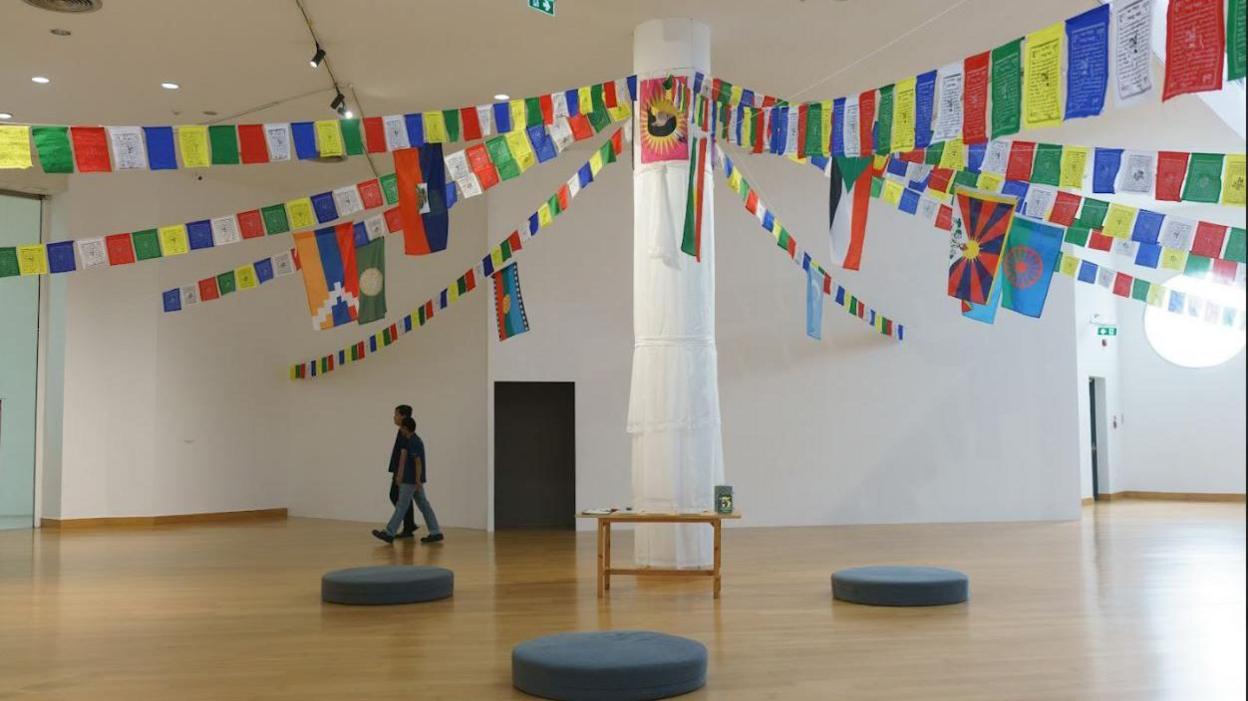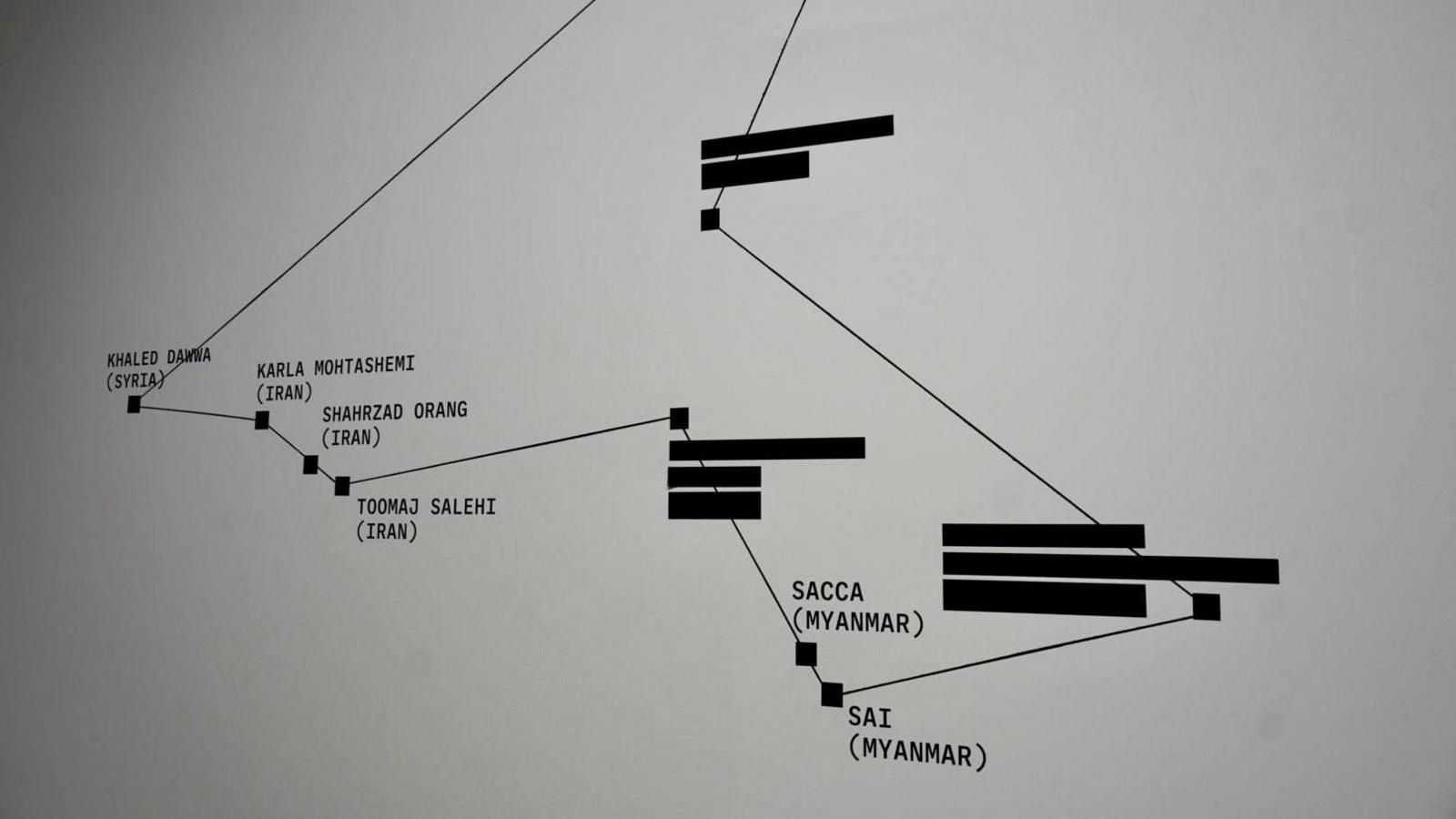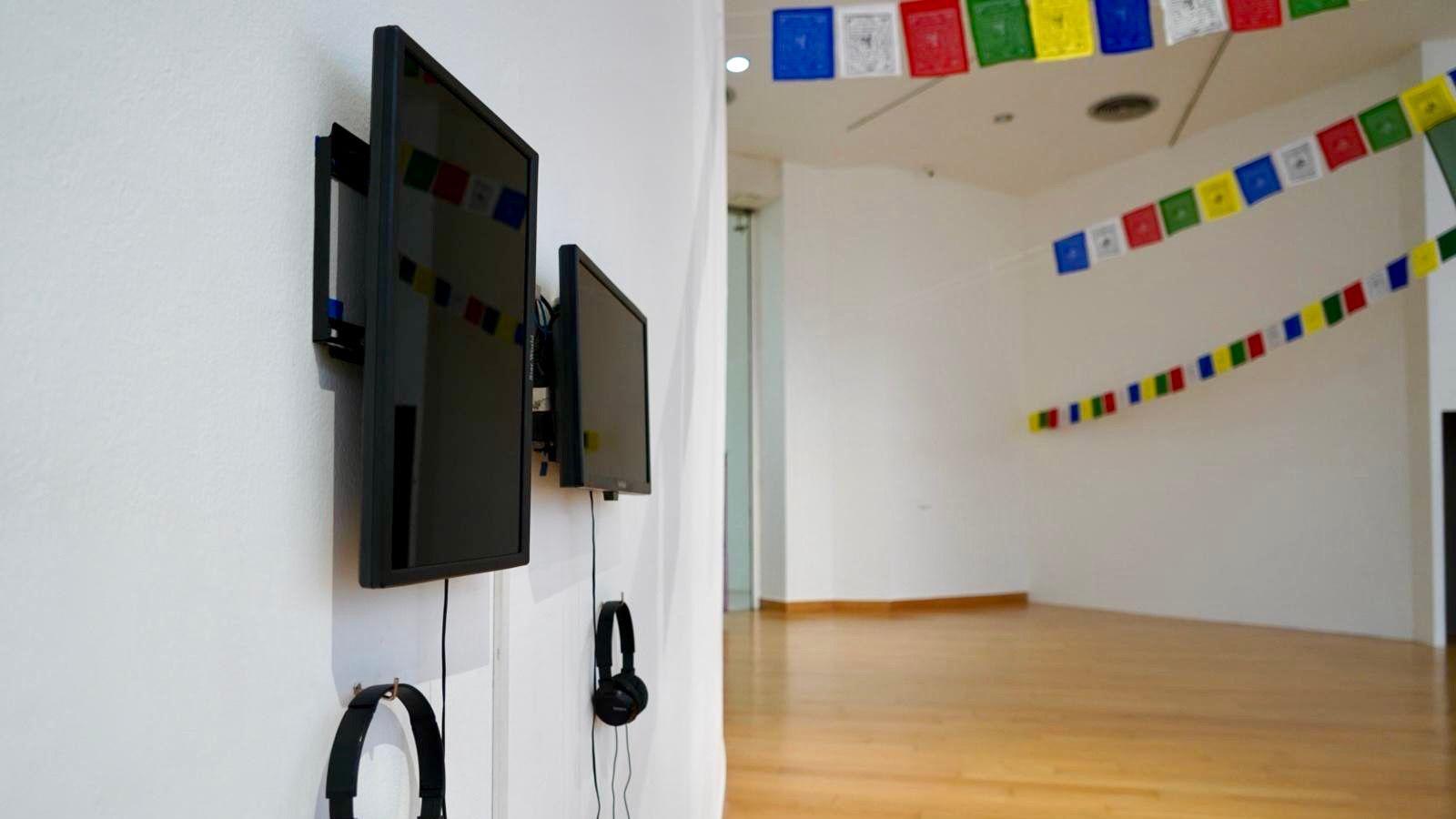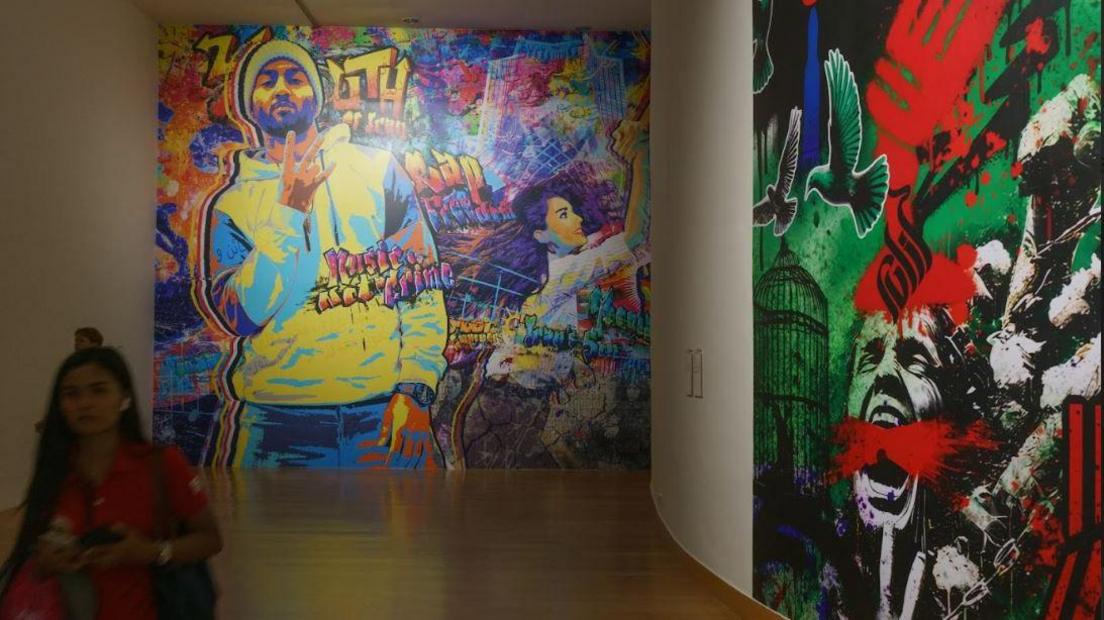An artist on the run, an exhibition censored: How China tried to silence a Thai art show

This file picture shows an art installation by Tibetan artist Tenzin Mingyur Paldron. Tibetan and Uyghur flags were later removed from it.
- Published
Three weeks ago, Burmese artist Sai was in Bangkok, celebrating the opening of an art exhibition he had curated with his wife at one of Thailand's top galleries.
Now the couple has fled to the UK where they plan to seek asylum, their exhibition about authoritarian repression censored after angering the Chinese government.
The couple alleges Thai police are looking for them, though a police spokesman has denied knowledge of this.
Human rights advocates have condemned the situation as an example of transnational repression.
Featuring exiled artists from countries such as China, Russia and Iran, Sai says his exhibition, which opened on 26 July at the Bangkok Arts and Cultural Centre, saw repeated visits by Chinese embassy representatives, accompanied by Bangkok city officials, shortly after it opened.
The show, titled Constellation of Complicity: Visualising the Global Machine of Authoritarian Solidarity, aims to show how authoritarian regimes collaborate in repression, according to one official description.
Sai claims that the Chinese officials lodged complaints about works by Tibetan, Uyghur and Hong Kong artists, and initially demanded that the show be completely shut down.
But, he said, the arts centre managed to negotiate a compromise that allowed the exhibition to continue after sensitive artworks and elements of art installations were removed.
A BBC journalist who visited the exhibition in Bangkok this week saw several artists' names covered up with black paint in the descriptions of artworks.
A description of the artists' homelands was also partially covered with black paint to conceal references to Tibet, Hong Kong and Xinjiang.

The names of Tibetan, Hong Kong and Uyghur artists had been blacked out
Most of the censored artworks were by the Tibetan artist Tenzin Mingyur Paldron. Television screens that were supposed to show several films by the artist - one was about the Dalai Lama - had been switched off.
Tibetan and Uyghur flags had also been removed, as well as a novel about a Tibetan family in exile and a postcard about China, Israel and Xinjiang.
A gallery staff member told the BBC that the exhibition had attracted many visitors in recent days after news of the censorship went viral online.
The arts centre's management did not respond to the BBC's questions.
But the BBC understands there was an email where the centre said they were "warned that the exhibition may risk creating diplomatic tensions between Thailand and China".
The email also stated they made the adjustments "due to pressure from the Chinese embassy" transmitted through the Thai foreign affairs ministry and the Bangkok city government, which is the centre's main supporter.
A Chinese embassy statement in response to BBC queries accused the exhibition of openly promoting Tibetan, Uyghur and Hong Kong independence.
It added that Thailand's "timely measures" showed that such a "false notion" has "no market internationally and is unpopular".
It also said the show "disregards facts... distorts China's policies on Tibet, Xinjiang, and Hong Kong, and harms China's core interests and political dignity".
"China opposes any attempt by anyone to use the pretext of cultural and artistic exchanges to engage in political manipulation and interfere in China's internal affairs."
The statement did not address allegations that its officials had pressured Thai authorities and the arts centre.

Television screens that were meant to screen Tenzin Mingyur Paldron's films had been switched off
The show's curators and exhibiting artists deny China's accusations.
Tenzin Mingyur Paldron said his films "conveyed stories from the heart and sent a message of global solidarity", adding that the censorship was part of a Chinese "campaign of erasure and suppression" of Tibetans around the world.
"Although I do support the people's will, there is no signage nor advocacy of independence [in the artwork]," said Clara Cheung, one of the artists whose names were blacked out. The Hong Kong artist's installation about China's surveillance in the UK was not affected.
Instead of independence from China, "we promote freedom of expression, self-determination, and self-identification... basic human rights", Sai told the BBC.
"Our exhibition gives space for artists who resist authoritarianism. These are voices often silenced in their own country. The fact that the Chinese Communist Party tries to shut it down proves the very point they are making."
'We realised we had to leave'
Sai and his wife decided to leave Thailand as they were worried of being deported back to Myanmar, also known as Burma, where Sai believes he will be persecuted for his activism against the junta.
Two days after the exhibition's opening, the couple was heading to their home in Bangkok when they realised that Thai police were looking for them.
The BBC understands the couple received texts from gallery staff alerting them to the police's visit to the exhibition, and that officers had asked for the couple's contact numbers.
At that moment, Sai said, "we realised we had to leave the country".
The couple immediately purchased the earliest flight to the UK they could find. "We only had a few minutes to pack our belongings. My wife was shaking, she couldn't pack anything," he said.
Just hours after they received the texts, they left the country.
Thailand's national police spokesman Achayon Kraithong told the BBC that he had not received any information that police officers were looking for Sai, and said the accusation was too broad to prove.
"Without specific information, we cannot comment on it. If there was enough evidence, we would be able to say if it actually happened or not," he said.
The couple had fled their homeland in 2021 following the military coup.
Sai's father is Lin Htut, the former chief minister of Myanmar's biggest state, Shan, and a member of Aung San Suu Kyi's ousted National League for Democracy. He was arrested and subsequently jailed on corruption charges.
Sai's mother was put under house arrest for several months, and is now still living under heavy surveillance.
Sai has long maintained the charges are false and insists that his father is a political prisoner. He has been vigorously campaigning for his release while criticising the junta.
The couple had eventually settled in Thailand and decided to put on their art show in Bangkok because of the large Burmese community there, and also because "Thailand plays a critical role to promote peace and stability for Myanmar... it's a secure place", said Sai.
But he no longer feels this way. "When a foreign power can dictate what art can be shown, it undermines cultural sovereignty," he said.
"Because of our activism, the targeting by authoritarian regimes against us has multiplied... my wife and I have no choice but to seek asylum in the UK."

The show in Bangkok is about authoritarian regimes and repression, featuring exiled artists from Iran, China and Russia
Lord Alton of Liverpool, chair of the UK Parliament's Joint Committee on Human Rights, told the BBC that Sai's case "illustrates the extensive reach of China's campaign of transnational repression", and that he would support Sai's bid for asylum.
"To pressure an art exhibition to censor exhibits in a cultural centre in another country is an outrageous violation of freedom of expression and should be widely exposed and condemned. The additional fears that this caused for Sai, leading him to flee Thailand for his security, are deeply concerning," he added.
The Human Rights Foundation has called the incident "intimidation" that "reflects a coordinated effort to suppress artistic expression", while prominent Thailand-based activist Phil Robertson said it was "outrageous and unacceptable" that Bangkok city officials allowed Chinese censorship.
The BBC has asked Thailand's prime minister's office for a response to these views.
Fears of China's transnational repression - broadly defined as a government harassing or surveilling individuals in other territories - have risen in recent years. It has raised questions of whether host countries are aware of such actions, or even complicit.
The relationship between Thailand and China has also been closely scrutinised.
In 2015 Swedish citizen Gui Minhai, one of the founders of a Hong Kong bookshop that sold and published titles critical of Beijing, mysteriously vanished while holidaying in Thailand.
He later reappeared in mainland China in police custody. Officials said he had gone to China voluntarily, but rights groups maintain he was abducted by Chinese agents., external
Earlier this year, at least 40 Uyghurs were deported from Thailand to China despite serious concerns expressed by the United Nations, the US and the UK. Beijing said the repatriation was conducted in accordance with Chinese, Thai and international law.
That case had occurred while Sai was still planning his show at the Bangkok Arts and Cultural Centre. Despite concerns, he said, the centre decided to go ahead with the exhibition anyway.
Now, Sai is contemplating his next steps while in the UK. He and his wife plan to showcase the uncensored art show in other countries once the exhibition ends its run in Bangkok in October.
He believes the censorship has ironically boosted the profile of their art show, with "now many people in the world interested in seeing the exhibition" and discussing it online.
"We didn't start this movement, the CCP (Chinese Communist Party) started it. We just laid the foundation (with the exhibition)... the rest has been nurtured organically, and endorsed, by CCP censorship like fertiliser."
Additional reporting by Thanyarat Doksone.